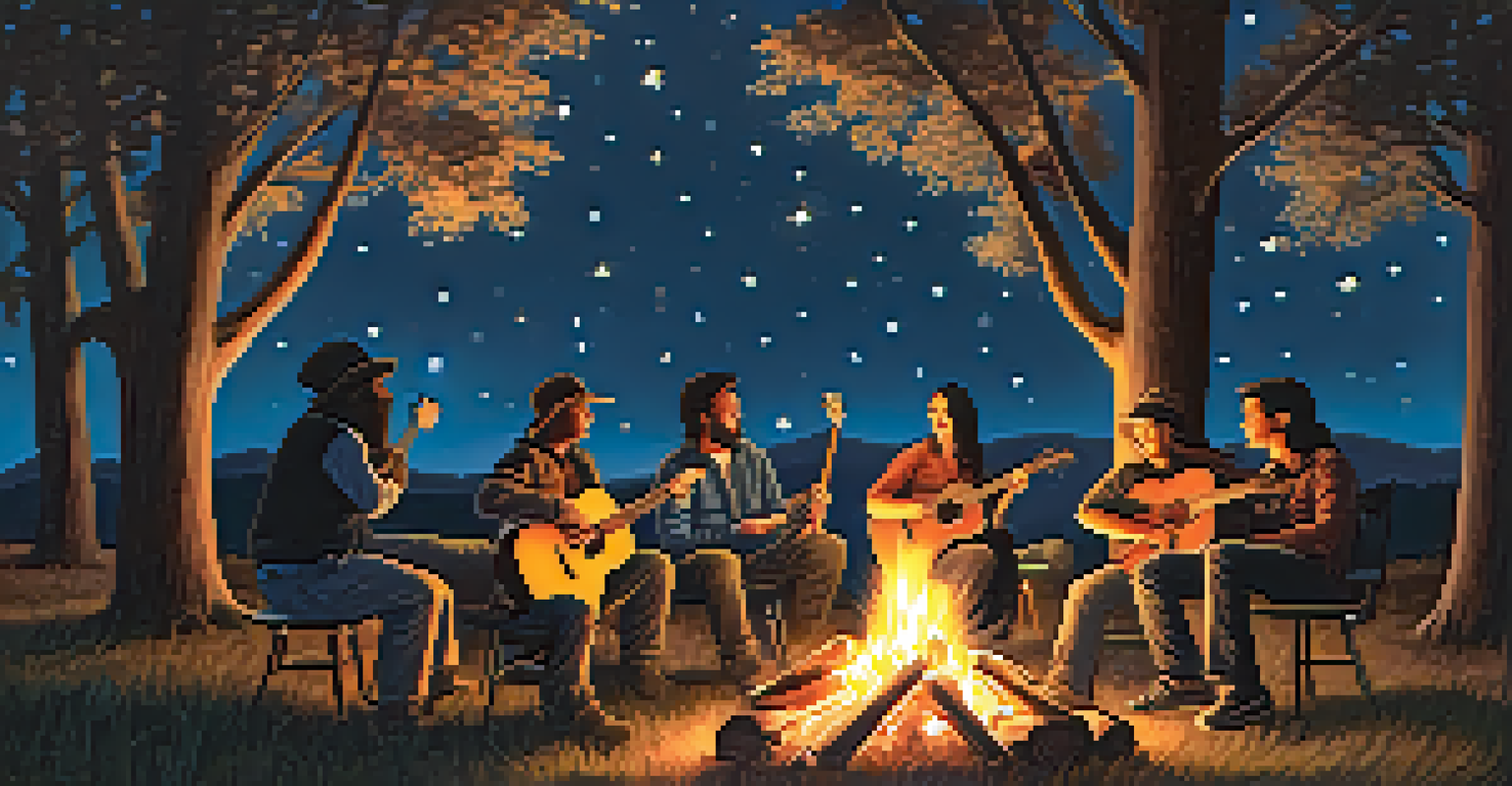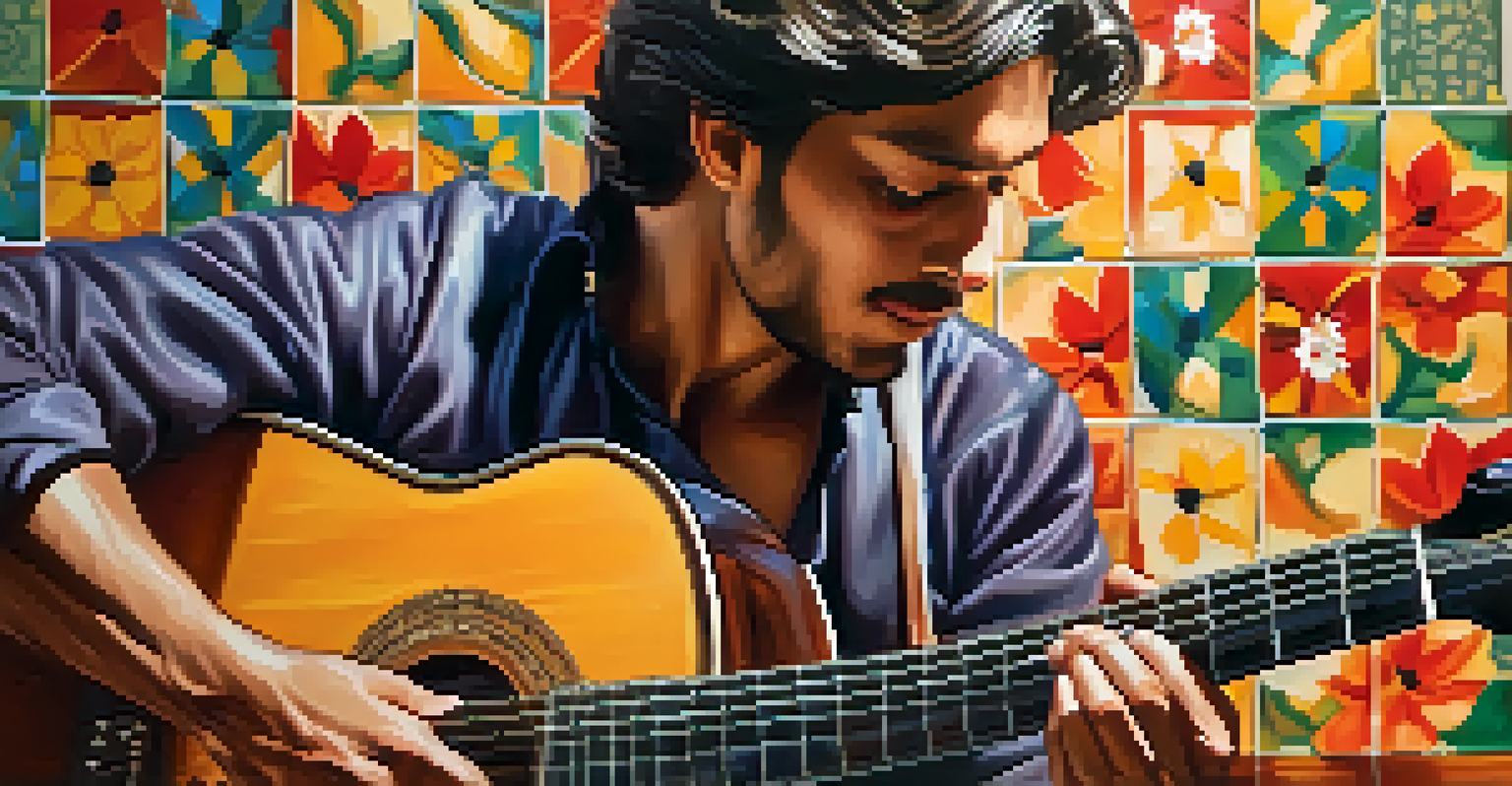How Guitar Music Shapes Cultural Identity Across Generations

The Guitar as a Cultural Symbol Across Generations
The guitar has long been more than just an instrument; it embodies cultural expressions and identities. From folk traditions to rock anthems, the guitar's versatility allows it to resonate with various cultural movements. Each generation finds unique ways to incorporate the guitar into their social fabric, creating a rich tapestry of musical history.
Music can change the world because it can change people.
For instance, in the 1960s, the guitar became a symbol of rebellion and change, closely associated with the counterculture movement. Artists like Bob Dylan used it to voice social issues, influencing countless young people. This connection between the guitar and cultural identity highlights how music can be a catalyst for change and self-expression.
As styles evolve, the guitar continues to adapt, shaping and being shaped by the cultural landscape. Today, genres like flamenco and hip-hop bring fresh interpretations, showing how the guitar can unite diverse communities. This ongoing relationship reveals the instrument's power in defining who we are across generations.
Guitar Music and Generational Connections
Music, especially guitar music, serves as a bridge connecting generations. Families often share songs that have significant meaning, creating bonds through shared experiences. Imagine a parent teaching their child a classic song; this simple act can spark conversations about memories and values, reinforcing cultural identity.

Take the example of 'Wonderwall' by Oasis, a song that has transcended its time to become a rite of passage for many young musicians. Generations have gathered around campfires or living rooms, strumming along and reminiscing about their own experiences. This shared musical journey nurtures a sense of belonging and continuity.
Guitar as a Cultural Symbol
The guitar serves as a powerful cultural symbol, reflecting and shaping identities across generations through its diverse musical expressions.
As technology evolves, so does the way we share and learn guitar music. Platforms like YouTube allow younger generations to explore classic tracks from their parents' youth, creating connections across time. This exchange not only preserves cultural heritage but also enriches personal identities through the lens of music.
Regional Variations: The Guitar's Global Influence
While the guitar is a universal instrument, its cultural significance varies significantly across regions. In Spain, flamenco guitarists engage in a passionate dialogue of rhythm and emotion, reflecting the country's rich cultural heritage. In contrast, in the United States, genres like blues and country showcase the guitar's role in narrating stories of struggle and resilience.
The guitar is a miniature orchestra in itself.
Each region contributes its unique flavor to guitar music, shaping cultural identity in profound ways. For example, the use of slide guitar in Delta blues tells tales of hardship and perseverance, while the intricate fingerpicking of Appalachian music mirrors the beauty of rural life. These regional styles help preserve local traditions while adapting to contemporary influences.
As musicians blend different styles, the guitar becomes a tool for cultural exchange. The fusion of genres, such as reggae with rock, illustrates how the guitar can break down cultural barriers and foster understanding. Ultimately, these regional variations highlight the guitar's ability to reflect and shape cultural identity worldwide.
The Role of Guitar Music in Social Movements
Throughout history, guitar music has played a pivotal role in social movements, giving voice to the voiceless. Songs like 'This Land Is Your Land' by Woody Guthrie became anthems for change, resonating with those fighting for civil rights. The guitar's ability to convey deep emotions makes it a powerful tool for activism.
Consider the impact of protest songs during the Vietnam War era. Musicians like Joan Baez and Neil Young used their guitars to speak out against injustice, inspiring a generation to take a stand. This connection between music and social movements underscores how guitar music can shape cultural identities tied to activism.
Music Connects Generations
Guitar music fosters connections among generations, creating shared experiences that reinforce cultural identity and personal narratives.
In today's world, artists continue this tradition, using guitar music to address contemporary issues. From climate change to social justice, the guitar remains a steadfast companion for those advocating for change. This ongoing dialogue illustrates the enduring power of music in shaping cultural identity and inspiring collective action.
The Evolution of Guitar Genres and Cultural Identity
As society evolves, so too does the music we create, and guitar genres are no exception. From classic rock to punk, each genre reflects the values, struggles, and aspirations of its time. This constant evolution allows the guitar to remain relevant, adapting to the cultural shifts of each generation.
Take punk rock, for instance, which emerged in the 1970s as a response to societal disillusionment. The aggressive sound and raw lyrics of bands like The Ramones resonated with youth seeking authenticity and rebellion. This genre's connection to cultural identity showcases how music can capture the zeitgeist of an era.
Today, genres like lo-fi and indie continue to resonate with younger audiences, weaving personal narratives into the fabric of cultural identity. The guitar's role in these evolving genres highlights its capacity to reflect the changing landscape of society. As new styles emerge, they contribute to a rich legacy of musical expression that defines who we are.
The Influence of Technology on Guitar Music and Culture
In our digital age, technology has revolutionized how we create, share, and experience guitar music. With the rise of social media and streaming platforms, musicians can now reach global audiences instantly. This accessibility democratizes music, allowing diverse voices to contribute to the cultural narrative.
For instance, platforms like TikTok have given rise to viral guitar challenges, fostering a sense of community among musicians and fans alike. This instant feedback loop encourages creativity and collaboration, bridging generational gaps as older artists mentor newcomers. Technology not only shapes how we consume music but also influences the sound and style of guitar playing.
Technology's Impact on Guitar
Advancements in technology have transformed guitar music, making it more accessible while raising important questions about authenticity and cultural respect.
However, this shift also raises questions about authenticity and cultural appropriation. As guitar music spreads across borders, it’s essential to respect and honor its origins. By understanding the cultural context behind the music, we can appreciate its richness while fostering an inclusive environment for future generations.
The Future of Guitar Music and Cultural Identity
Looking ahead, the future of guitar music is as vibrant and diverse as ever. As new generations embrace the instrument, they will undoubtedly infuse it with fresh perspectives and innovations. This continual evolution ensures that the guitar remains a vital part of cultural identity for years to come.
Emerging genres, technologies, and global influences will shape the sound of tomorrow. Imagine a world where traditional styles blend seamlessly with modern elements, creating entirely new musical experiences. Such fusion not only keeps the guitar relevant but also enriches the cultural landscape.

Ultimately, the guitar will continue to be a powerful tool for self-expression and connection. As we navigate the complexities of identity in an ever-changing world, the music we create with guitars will reflect our shared experiences, fostering a deeper understanding of who we are across generations.